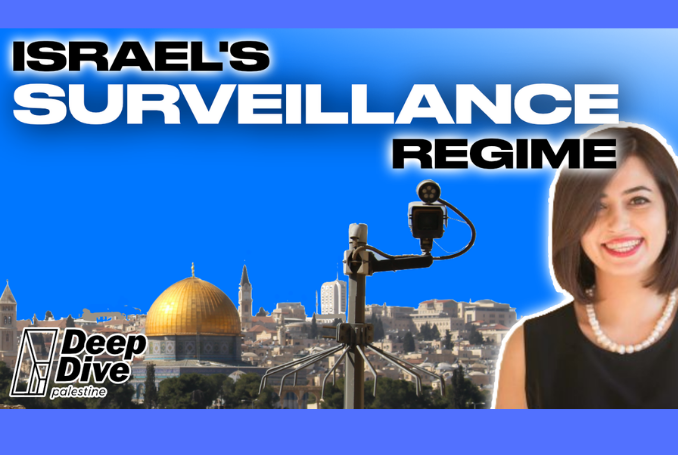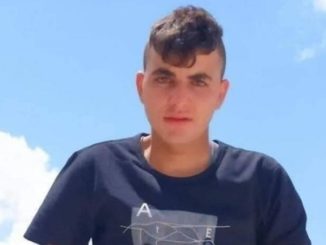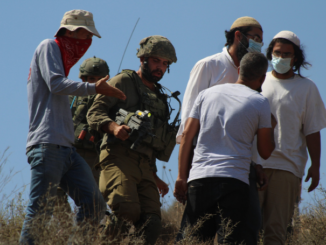
‘Nowhere to Hide: The Impact of Israel’s Digital Surveillance Regime’, is the title of Palestine Deep Dive’s latest live show which takes an in-depth look at the multifaceted regime of digital surveillance Israel imposes on the Palestinian people.
It also examines how these technologies are being exported abroad, threatening the privacy and freedoms of people around the world today.
Deep Dive’s host, Mark Seddon, also a former Al Jazeera correspondent and former speechwriter for UN Secretary-General Ban-ki Moon, speaks with Palestinian digital rights defender, Mona Shtaya.
Mona currently serves as 7amleh’s Advocacy Advisor and is a resident scholar with the Middle East Institute’s Cyber Program.
She begins by explaining how Jeremy Bentham’s 18th-century idea of the “panopticon’ relates to what Palestinians experience today: “The panopticon is basically a mechanism of social and psychological control. It’s a rounded prison… [and] in the center of this prison it has a watchtower where the guard is standing.”
“The prisoners don’t know if someone is watching them or not… this is basically what we Palestinians are exposed to on the ground. We are being watched and surveilled on every single thing that we are doing – if we are walking in the streets (with the CCTV cameras), if we are using our phones (with spyware), if we are on the internet (with the surveillance of digital spaces) and even if we bought a new device… just crossing a military checkpoint in the West Bank, we are also being surveilled and monitored.”
“Basically, we Palestinians are living now in the post-modern panopticon. It’s been updated. They utilize that technology to update that concept of the panopticon and make us feel that we are surveilled all the time.”
Pegasus
Pegasus, a software developed by the Israeli company NSO Group, allows users to remotely take over cellphones, transforming them into spying devices.
It is capable of extracting and recording all information from a mobile device including contact lists, passwords, messages, browsing history, geographic location data and record from cameras and microphones.
Mona exposes how targets of Pegasus have often been human rights defenders and journalists:
“Let’s start from what happened last November when six Palestinian human rights defenders [had] their mobile phones infected with Pegasus spyware”
In November, it was revealed that six Palestinian human rights defenders had been hacked with the software, all of whom belonged to organizations recently listed by Israel as “terrorist organizations” including Defense for Children – Palestine and Al-Haq.
“We are still the biggest laboratory for the Israelis to test their surveillance technologies on us before selling that worldwide and profiting from the occupation,” declares Mona.
Nearly every member of NSO’s research team is a veteran of Israel’s intelligence services, The New York Times recently revealed, and that the company’s most esteemed employees are all graduates of elite training courses, including a secretive and prestigious Unit 8200 program called ARAM, “that accepts only a handful of the most brilliant recruits and trains them in the most advanced methods of cyberweapons programming.”
Mona explains how Israel is exporting this technology to countries around the world, affecting the right to privacy and freedom of expression of citizens across the globe:
“We can see also other governments who are collaborating with the Israeli government, and with Israeli surveillance corporates, to buy such surveillance techniques and to use that against their human rights defenders, political opponents, journalists.”
“We’ve seen many cases in the UAE, in Saudi Arabia, and Morocco, and in many other countries in the Arab region, where those regimes basically are buying such spyware to spy on their political opponents. Just in the past couple of days, it was revealed about a new case where around 200 mobile phones… and more than 200 Spanish mobile numbers were selected as possible targets for surveillance by NSO Group clients.”
Blue Wolf
“The Blue Wolf basically is when the Israeli soldiers on the checkpoints are taking pictures of Palestinians and they are sending those pictures to their database because they are archiving our pictures, our IDs,” says Mona.
“This application, which they [mockingly] call “Palestinian Facebook”… is showing them ‘how dangerous this Palestinian is’ because it gives them an indicator if this person is [considered] a security threat or not,” she continues.
It was recently revealed in Haaretz that Israeli occupation forces in the West Bank received instructions from their commanders that in any shift at a checkpoint or guard post they must enter the details and photos of “at least 50 Palestinians” to the IDF’s “Blue Wolf” database, otherwise they will not be released from their shift.
Israeli authorities have also recently introduced facial recognition cameras in Hebron, allowing soldiers to identify Palestinians without checking their IDs.
In Jerusalem, there are currently 1,000 cameras installed in the city capable of identifying certain objects.
Mona assertively declares Israel is indeed a “surveillance state” given its regime of sophisticated methods for spying on Palestinians.
Gaza
Asked whether Israel’s surveillance of Palestinians is worse in the Gaza Strip or the West Bank, Mona responds, “there are different aspects when we are talking about surveillance, and it would never ever be good surveillance or better surveillance because surveillance is surveillance everywhere at any time.”
Referencing a recent article in Middle East Eye, Mona states: “Israelis are putting bugs into every mobile phone that is entering the Gaza Strip so that they can continue to spy on people.”
According to Middle East Eye, a former member of the Israeli Army’s elite signals 8200 unit declared that Israel can listen to “every telephone conversation taking place in the West Bank and Gaza” with staff sometimes “saving and sharing with friends” intimate conversations between Palestinians.
A short documentary released by Middle East Eye in July 2020, Constant Surveillance, captures the anxiety of children and adults alike on the ground in Gaza.
Loud buzzing from Israeli military drones flying low over the besieged enclave reminds Palestinians they are constantly being watched, and that sophisticated weaponry could be deployed against them at any moment.
Infrastructure
Mona reminds the audience that even the ICT sector of the West Bank and Gaza Strip is ultimately controlled by Israel.
“Palestinians still today, they don’t have access to the internet. Basically, in the West Bank, they have access to the 3G, and in Gaza Strip, they are still using 2G while Israelis are now almost using 5G. There is this kind of digital divide or digital apartheid that is being used. Controlling the infrastructure, meaning that also they can violate people’s right to privacy because everything is built on their infrastructure.”
To download a mobile application may take 40 minutes on 2G compared to 8 seconds on 4G.
Earlier internet connections such as 2g are also considerably less secure and more vulnerable to external penetration.
Censorship
To close the show, Mark asks Mona if she can summarise the situation of censorship faced by Palestinians online, especially on social media.
Mona responds: “I don’t know if people are following up, but last month Facebook stopped AlQastal Facebook page, and AlQastal is a media outlet based in Jerusalem, and they are covering day-to-day human rights violations and the news there.”
“Over the past month, escalations were going on the ground. People were really threatened and they were really attacked by the Israelis. At that time, it was really important to have this media outlet in Jerusalem. Facebook basically took down this page. They restored it later on, and we were able to – We at 7amleh… reported that and we were able to restore it.”
In the last few months on Meta’s blog, the company used the word ‘resistance’ to describe the Ukrainian people’s right to fight the Russian invasion, meanwhile, the word ‘resistance’ itself was reportedly the reason why some Palestinian content has been taken down from the platform.
Mona was keen to reiterate, “basically, we are still censored. Our narrative is still censored.”
(Palestine Deep Dive)







